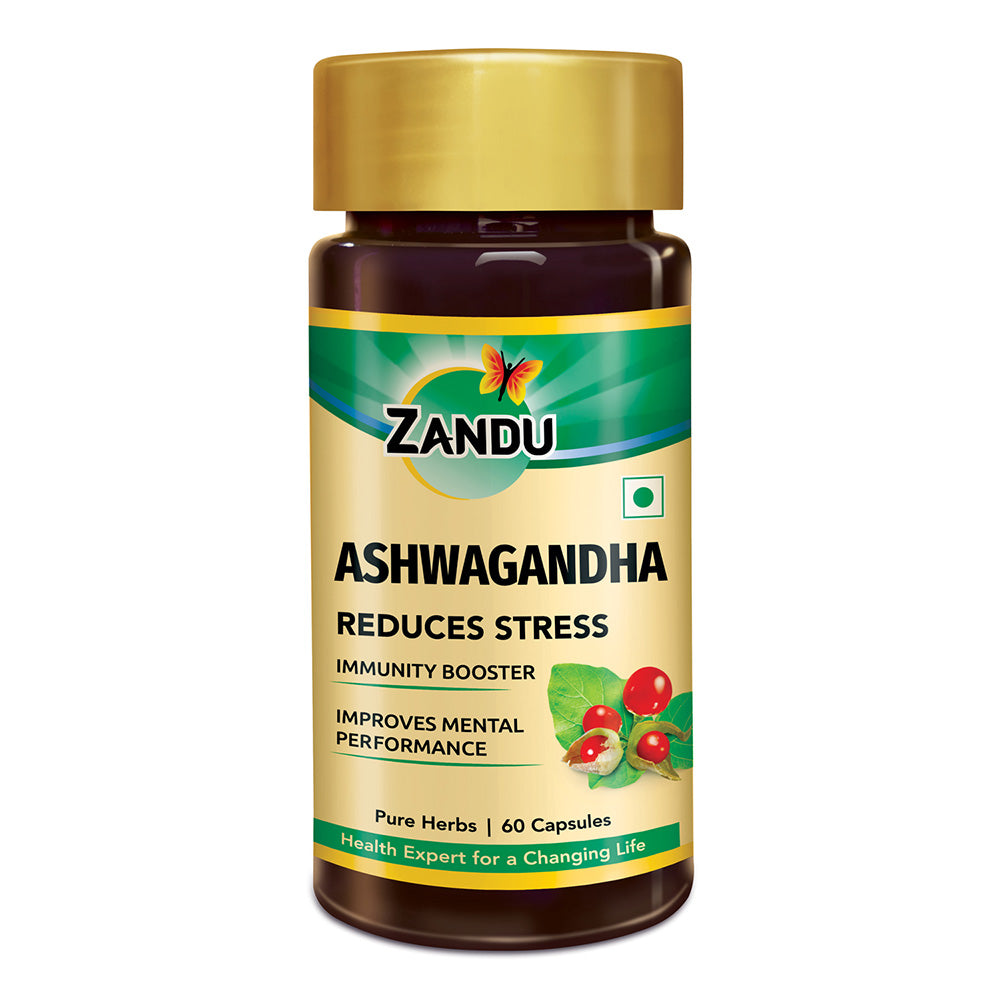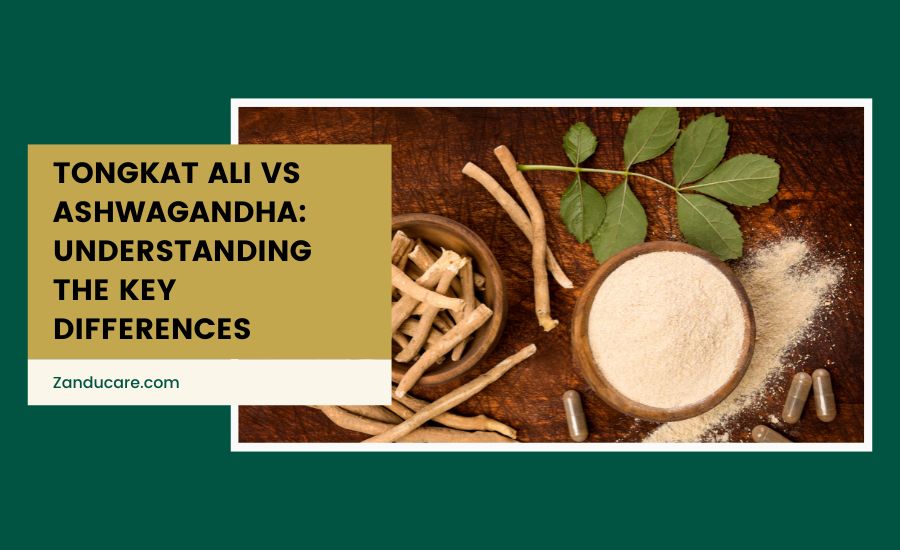
Reduce Stress & Cortisol | Improve Sleep & Muscle Recovery | >5% Withanolide Content | Scientifically Tested

Reduces Stress & Anxiety | 100% Natural Active | Root Extract | Improves Mental Performance | Scientifically Proven
Key insights:
- Energy vs Calm: Tongkat Ali fuels testosterone, stamina, and vitality, while Ashwagandha soothes stress, anxiety, and promotes better sleep.
- Tailored Benefits: Choose Tongkat Ali for muscle growth and physical performance or Ashwagandha for mental clarity and immune support.
- Your Timing Matters: Tongkat Ali energizes your day; Ashwagandha relaxes your night.
- Unique Properties: Tongkat Ali enhances physical strength, while Ashwagandha’s adaptogens rebalance your mind and body.
- The Perfect Pair: Combine them for all-day energy and nighttime tranquility.
Tongkat Ali and Ashwagandha are two of the most widely used and studied herbs in herbal supplements. Both have been praised for their potential health benefits, particularly to stress, energy, and hormonal health. However, while they may share some similarities in their ability to improve wellness, they are distinct in their origins, active compounds, and effects on the body. If you’re considering adding one of these herbs to your wellness routine, it’s important to understand their differences.
This article will explore the key differences between Tongkat Ali and Ashwagandha, offering insight into their unique properties and benefits and how each herb might be suited to different health needs.
Did You Know?
- Tongkat Ali boosts testosterone, libido, and muscle mass.
- Ashwagandha reduces stress and enhances sleep quality.
- Tongkat Ali energises your day; Ashwagandha calms your night.
- Combining both gives you all-day vitality and restful sleep.
What is Tongkat Ali and Ashwagandha?

Tongkat Ali and ashwagandha are two herbal supplements that have been used traditionally to help manage stress and support healthy hormone levels. Tongkat ali, derived from the Southeast Asian plant Eurycoma longifolia, contains compounds that may boost testosterone production and improve mood.
Ashwagandha, from the Indian shrub Withania somnifera, helps regulate the body's stress response, primarily through effects on the HPA axis and cortisol levels. Together, these two herbs may help alleviate anxiety, improve focus and alertness, support libido and body composition, and shield the body from detrimental impacts of physical, mental or emotional stress. Their mechanisms differ, but they share adaptogenic properties that promote homeostasis.
Difference Between Tongkat Ali and Ashwagandha
|
Aspect |
Tongkat Ali |
Ashwagandha |
|
Origin |
Native to Southeast Asia (e.g., Malaysia, Indonesia) |
Native to India and North Africa |
|
Traditional Use |
Used primarily to enhance male vitality, testosterone levels, and athletic performance |
Used in Ayurvedic medicine as an adaptogen, promoting stress relief, energy, and overall wellness |
|
Key Active Compounds |
Eurycomanone, eurycomanol, quassinoids |
Withanolides, alkaloids, saponins |
|
Main Benefits |
- Boosts testosterone - Improves libido and muscle mass - Enhances energy and endurance |
- Reduces stress and anxiety - Improves mental clarity and cognitive function - Supports immune health |
|
Primary Effects |
Focuses on physical vitality and strength |
Focuses on mental well-being, stress management, and overall rejuvenation |
|
Impact on Testosterone |
Directly boosts testosterone levels |
May indirectly support testosterone by lowering cortisol levels |
|
Best For |
- Athletes - Those looking to improve physical performance and libido |
- Individuals dealing with chronic stress or anxiety - People looking for a calming and immune-supportive herb |
|
Side Effects |
- Insomnia - Irritability - Nervousness (in high doses) |
- Mild upset stomach - Drowsiness - Headaches (in some cases) |
|
Form |
Typically sold as capsules, extracts, or powder from the root |
Typically sold as powder, capsules, or liquid extract of the root or leaves |
Health Benefits of Tongkat Ali and Ashwagandha
Below are some of the advantages of Tongkat Ali and Ashwagandha:
Tongkat Ali
Some of the benefits of this herb are as follows:
1. Can Increase Sex Drive
Tongkat Ali is a plant with long, twisted roots. In the Malayalam language spoken in India, its name translates to "Ali's walking stick." This may refer to the shape of the roots. Others believe the name refers to the plant's use as an aphrodisiac.
One of the main uses of Tongkat Ali is as a sexual stimulant. Some research suggests taking Tongkat Ali supplements can increase libido or a person's desire to have sex.
2. Helps in Reducing Stress

Tongkat Ali may help reduce stress. It could lower stress hormones and improve mood. A 1999 study found that Tongkat Ali extract helped reduce anxiety in mice, similar to a common anti-anxiety medication.
More research is needed, but some studies in people show promise. A one-month study gave 200mg of Tongkat Ali extract daily to 63 adults with moderate stress. Their saliva had 16% less of the stress hormone cortisol than those given a placebo.
Participants also reported feeling significantly less stressed, angry, and tense after taking Tongkat Ali. So, while early research shows that Tongkat Ali may help relieve stress, more studies in humans are still needed.
3. Has Been Shown to Improve Male Fertility
Research shows Tongkat Ali supplements may increase semen volume and improve how well sperm moves. Tongkat Ali might also help restore testosterone levels in people with low testosterone production, known as late-onset hypogonadism.
Some early evidence suggests Tongkat Ali could be an alternative to testosterone replacement therapy. This therapy is used when people don't make enough testosterone. However, more studies are still needed to confirm if tongkat ali could replace standard testosterone therapy.
4. Strengthens Muscle Mass

This herbal remedy contains a natural ergogenic acid, which improves muscle mass and athletic performance. The abundance of active ingredients in quassinoids, such as Eurycomaoside, eurycolactone, and Eurycomanone, helps the body use energy more effectively, reduces fatigue, and boosts stamina and endurance.
5. Improve Erectile Function
Some research shows Tongkat Ali may improve erectile function. One study had men take 300 milligrams of Tongkat Ali extract daily for 12 weeks. Compared to those who took a placebo, these men reported better erections. This included getting erections more often during sex. Tongkat Ali may also help erections be harder, making penetration easier.
Scientists are unsure exactly how Tongkat Ali helps erections. They think unique plant compounds called bioactive compounds may be responsible. More research is still needed, though.
One review examined 11 studies on Tongkat Ali and erections. Seven studies showed that Tongkat Ali notably improved erections, but four did not. So, more research is still needed to determine whether Tongkat Ali can treat erectile dysfunction.
Ashwagandha

Below are some of the health benefits of Ashwagandha:
1. Helps in Reducing Stress and Anxiety
Ashwagandha is an herb that may help reduce stress. Studies have shown it can lower stress hormones like cortisol. It may also help improve sleep quality in people with stress.
In one small study of 58 people, those who took ashwagandha extracts for 8 weeks had less perceived stress and lower cortisol levels than those who took a placebo. They also slept better.
Another study with 60 people found that taking 240 mg per day of ashwagandha extract for 60 days significantly reduced anxiety more than a placebo treatment.
So, early research suggests ashwagandha supplements may help with stress and anxiety. However, more research is still needed to determine the best ashwagandha dosage and form to treat anxiety disorders. A 2021 review concluded insufficient evidence to recommend specifics around using ashwagandha for these conditions.
2. Athletic Performance
A 2021 research review examined multiple studies on ashwagandha and exercise performance. It found that ashwagandha supplements may help improve strength, endurance, and recovery in healthy men and women.
Specifically, the review suggested that taking 300-500 mg of ashwagandha twice daily could benefit people doing intense resistance or cardio training. The doses can be taken once in the morning and again before bedtime.
Recent evidence indicates that ashwagandha supplementation may enhance physical performance and recovery. Based on the research, doses of 300-500 mg taken twice daily, morning and night, are recommended for those doing strenuous workouts.
3. Improves Sleep Quality
Early research suggests that ashwagandha supplements may help improve sleep quality for some people struggling with insomnia or anxiety. A few small studies have investigated the effects of ashwagandha on sleep. In one study of 29 people with insomnia, participants took 300 mg of ashwagandha twice per day. Compared to a placebo group, those taking the ashwagandha fell asleep faster, spent more time asleep while in bed, and reported better overall sleep quality.
Another study with 40 anxious participants found that taking between 300-600 mg of ashwagandha daily led to self-reported sleep improvements compared to a placebo after 4 and 8 weeks of treatment.
While larger and longer studies are still needed, these preliminary findings suggest that taking ashwagandha at dosages of 300-600 mg daily may aid sleep in those dealing with conditions like anxiety and insomnia that can disrupt sleep. Ashwagandha supplements may improve the ability to fall and stay asleep and improve sleep quality in affected individuals.
3. Cancer

Stress, anxiety, and exhaustion are common among cancer patients. Ashwagandha might be a good choice for anyone looking for non-pharmaceutical ways to alleviate these symptoms.
According to a 2023 evaluation, ashwagandha might have anti-cancer effects. However, research has not yet supported its application in preventing or treating cancer.
4. Improves Arthritis Symptoms
A small study suggests that ashwagandha may alleviate rheumatoid arthritis symptoms. After taking 100 mg of Sidh Makardhwaj, another Ayurvedic medication, daily for four weeks and 10 grams (g) of ashwagandha powder daily for three weeks, study participants reported feeling better.
A mercury-based substance called Sidh Makardhwaj is used to treat neurological conditions and rheumatoid arthritis.
Although this is encouraging, additional research is required to comprehend the potential effects of ashwagandha on arthritis completely.
Do check our Pure Ashwagandha Products:
Side-Effects of Tongkat Ali and Ashwagandha
- Tongkat Ali is generally safe for short-term use, but it can have side effects, particularly when taken in large doses. Some users report insomnia, nervousness, or irritability, likely due to its stimulating effects on testosterone and cortisol levels.
- Ashwagandha is also considered safe for most people, but excessive use can cause some mild side effects such as upset stomach, drowsiness, or headaches. Because it is sedative, it’s best taken in the evening or when you have time to rest.
Can you Combine Ashwagandha and Tongkat Ali?
Ashwagandha and tongkat ali are two herbal supplements that are sometimes taken together. However, taking only one supplement at a time is usually better. This makes it easier to tell if that particular supplement works well for you.
Taking ashwagandha and tongkat ali together has not been well studied, so we don't know for sure if it is safe or more effective. Both supplements seem to be well tolerated when taken alone, with only minor digestive side effects reported. Still, more research is needed to combine them.
Pregnant women, breastfeeding mothers, and people with conditions like heart disease or diabetes should be careful with herbal supplements. They should check with their doctor before taking ashwagandha, tongkat ali, or other herbal remedies. Their doctor can help decide if these supplements are safe for them to take.
Conclusion: Which one Should you Choose?
Tongkat Ali and Ashwagandha offer valuable health benefits, but the right choice depends on your needs. Tongkat Ali may be the better option if you are looking for a natural way to boost testosterone levels, enhance muscle growth, or improve physical performance. On the other hand, if your main concern is managing stress, improving mental clarity, or supporting your immune system, Ashwagandha would likely be the more appropriate choice.
In some cases, people may use both herbs in tandem, as they complement each other well. For instance, taking Tongkat Ali for energy and vitality during the day and Ashwagandha in the evening for stress relief and improved sleep can provide a well-rounded approach to wellness.
As with any supplement, it’s important to talk to a healthcare provider before starting any new herb or supplement regimen, especially if you have underlying health conditions or are taking medication.
Ultimately, these herbs have earned their place in natural wellness for their unique properties. By understanding the differences between Tongkat Ali and Ashwagandha, you can decide which one might best support your health goals.
FAQs
1. What are the main differences between Tongkat Ali and Ashwagandha?
The main differences are that Tongkat Ali comes from Southeast Asia while Ashwagandha comes from India. Tongkat Ali focuses more on boosting physical vitality like testosterone and muscle mass, while Ashwagandha focuses more on mental well-being like relieving stress and anxiety.
2. What are the key active compounds in each herb?
The key active compounds in Tongkat Ali are eurycomanone, eurycomanol, and quassinoids. For Ashwagandha, they are withanolides, alkaloids, and saponins.
3. How might Tongkat Ali and Ashwagandha help with erectile dysfunction?
Some early research shows Tongkat Ali may help improve erections by increasing erection frequency and hardness. Ashwagandha has not been directly linked to improving erectile dysfunction but may help indirectly by reducing stress and anxiety.
4. What are the optimal dosage recommendations for each herb?
Doses of 200-300mg per day are common for Tongkat Ali. For Ashwagandha, doses range from 300-600mg daily, sometimes split into two doses in the morning and evening.
5. Can you take both Tongkat Ali and Ashwagandha together?
Yes, you can take both herbs together, as they complement each other well. Taking Tongkat Ali for energy and Ashwagandha for stress relief and sleep support can provide a comprehensive approach.
References:
- One of the main uses of Tongkat Ali is as a sexual stimulant. Some research suggests taking Tongkat Ali supplements can increase libido or a person's desire to have sex.(https://www.mdpi.com)
- A 1999 study found that Tongkat Ali extract helped reduce anxiety in mice, similar to a common anti-anxiety medication. (https://pubmed.ncbi.nlm.nih.gov)
- A one-month study gave 200mg of Tongkat Ali extract daily to 63 adults with moderate stress.(https://pmc.ncbi.nlm.nih.gov)
- Tongkat Ali might also help restore testosterone levels in people with low testosterone production, known as late-onset hypogonadism.(https://www.mdpi.com)
- However, more studies are still needed to confirm if tongkat ali could replace standard testosterone therapy.(https://www.mdpi.com)





